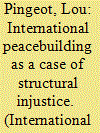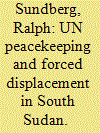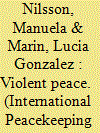|
|
|
Sort Order |
|
|
|
Items / Page
|
|
|
|
|
|
|
| Srl | Item |
| 1 |
ID:
172166


|
|
|
|
|
| Summary/Abstract |
Do UN peacekeeping forces protect civilians from harm in post-war environments? Current evidence suggests that the answer to this question is yes. But extant research mostly examines this relationship at the country-level and consequently has logical difficulty tracing decreases in civilian fatalities to actual peacekeeper activities. We would have more confidence in the ability of peacekeepers to limit harm and protect non-combatants if the reduction in violence occurred locally where blue helmets were positioned. Using original geocoded data of yearly UN deployments in four Sub-Saharan African conflicts (Sudan, South Sudan, Democratic Republic of Congo, and Ivory Coast), we find that peacekeeping units get locally deployed to violent post-war areas and they reduce the level of civilian harm almost immediately. But, in areas without violent clashes between government forces and rebels, we find peacekeeping units more responsive to civilian targeting by rebels, which indicates a reluctance among peacekeepers to confront government forces that target civilians. While host nation consent is crucial for the success of a peacekeeping mission, the findings from this study caution against nurturing illiberal regimes by failing to check government atrocities. The failure to confront government abuse can jeopardize long-term peace and reconciliation.
|
|
|
|
|
|
|
|
|
|
|
|
|
|
|
|
| 2 |
ID:
172165


|
|
|
|
|
| Summary/Abstract |
Militaries around the world have benefited from computerized games. Many recruits have been attracted to the military through military-style video games. After recruitment, games and simulations provide an important means of soldier training, including before actual deployments. However, electronic games are lacking for UN peace operations. The multidimensionality of peacekeeping has yet to be simulated in serious games to complement the many games that too often depict a binary battlefield of blue-team versus red-team (or, often in public games, good versus evil). Not only could soldiers benefit from nuanced and ambitious peace-related games, so too could civilian peacekeepers, and the public at large. Peacekeeping gaming should not be merely at the tactical level; the operational and strategic levels can be gamed as well. The decision-making in future peacekeeping simulations could help instruct conflict-resolution and critical thinking skills. The paper posits that such digital games could be an important tool for current and future peacekeepers, both military and civilian. Commercial games could also help educate the public on UN peacekeeping. The paper suggests that the United Nations partner with some member states and perhaps the video game industry to provide in-depth training simulations that mirror the challenges and complexities of modern peace operations.
|
|
|
|
|
|
|
|
|
|
|
|
|
|
|
|
| 3 |
ID:
172164


|
|
|
|
|
| Summary/Abstract |
In the face of the repeated failure of international peacebuilding to build peace, one strand of the literature argues that failure can only be understood by ‘zooming in’ – by focusing on peacebuilders, the local populations they purport to help, and the relationship between them. This article draws on the insights of this literature to argue that international peacebuilding should be understood as an instance of structural injustice. Studies of the encounter between international interveners and local populations tend to focus on the differences between these groups and their problematic relationship. I argue that ‘zooming in’ reveals much more than the differences between interveners and locals: it uncovers how their relationship presents parallels and similarities with others, such as the relation between colonizers and colonized. The relationship between internationals and locals is problematic not because of each group’s characteristics and their difference, but because of the social positions they relate from. These hierarchical social positions give some groups the power to intervene in the lives of others. The article argues that the encounter between internationals and locals should be ‘de-exoticized’ and that hierarchy, rather than difference, should be at the centre of the critical peacebuilding literature.
|
|
|
|
|
|
|
|
|
|
|
|
|
|
|
|
| 4 |
ID:
172161


|
|
|
|
|
| Summary/Abstract |
Many peace support operations have faced allegations of sexual exploitation and abuse perpetrated by UN personnel against members of local communities. Some of these intimate relations result in children being born but there is little empirical data on the experiences of women and girls who conceive and bear these children. We analyse 265 self interpreted narratives from community members in Haiti about children fathered by UN personnel and born to local women or girls. The mixed methods results highlight three important themes: (a) poverty is a key underlying factor contributing to sexual exploitation and abuse by peacekeeping personnel, (b) the repatriation of implicated peacekeepers often leaves the woman and child in exacerbated poverty, and (c) intimate relations with fair-skinned peacekeepers and having fair-skinned children are sometimes perceived as desirable. The data highlight that children fathered by MINUSTAH personnel are typically being raised in settings of extreme economic deprivation and are often denied access to education and other basic services that would enable them to break the cycle of poverty. While the overarching need identified in this analysis is financial, additional research with the children themselves in warranted to identify other needs and to inform policies and programmes intended to improve their well-being.
|
|
|
|
|
|
|
|
|
|
|
|
|
|
|
|
| 5 |
ID:
172162


|
|
|
|
|
| Summary/Abstract |
Does UN peacekeeping reduce the number of people forcibly displaced by violence? While previous research has found that the presence and size of peacekeeping deployments can reduce violence, little is known about how peacekeepers affect other aspects of civilian protection. Using original data on sub-national events of forced displacement and the location and size of UN troop deployments this study systematically evaluates the criticized efforts of UNMISS in South Sudan, while simultaneously testing hypotheses on peacekeepers and forced displacement. It is hypothesized that increasing numbers of troops affect the flight equation among civilians through the promise of and actual deterrence of violence. These deterrence-based hypotheses are also discussed in relation to the South Sudan context, creating scope conditions for their possible application in this case. The statistical analysis provides, however, no robust evidence for peacekeepers reducing the occurrence or levels of forced displacement, and only weak evidence of displaced congregating in larger numbers around peacekeeping locations. The paper ends by arguing that the theoretical argument provided may still be valid, but that an effect was not feasible to identify in South Sudan where the peacekeeping mission – despite its comparatively large numbers – lacks credible deterrent capacity.
|
|
|
|
|
|
|
|
|
|
|
|
|
|
|
|
| 6 |
ID:
172163


|
|
|
|
|
| Summary/Abstract |
Countries that sign a peace agreement to emerge from protracted violent conflict often begin reconstructing their societies amidst continued high levels of violence. Responding to this situation, national security policies often identify core threats primarily from a state perspective, disregarding local community perceptions of threat and insecurity. This paper is based on interviews conducted in Colombia with members of three rural communities that have undergone and still suffer from different forms of post-accord violence. Differentiating between measurable and lived security threats, it identifies the communities’ perceptions of threats to their current security situation and compares them to those of the state security actors stationed in the communities. Embedded in the call for more pragmatic, bottom-up peacebuilding, we argue that security is context-specific and stress the importance of understanding the diversity of local community perspectives on security for building sustainable peace under conditions of ongoing violence. Final policy recommendations thus underline the need for a more differentiated approach towards improving security levels that meets the specific threat perceptions and security concerns of local communities and improves cooperation between the communities and state security actors to bring sustainable, localized peace to context-specific security environments.
|
|
|
|
|
|
|
|
|
|
|
|
|
|
|
|
|
|
|
|
|